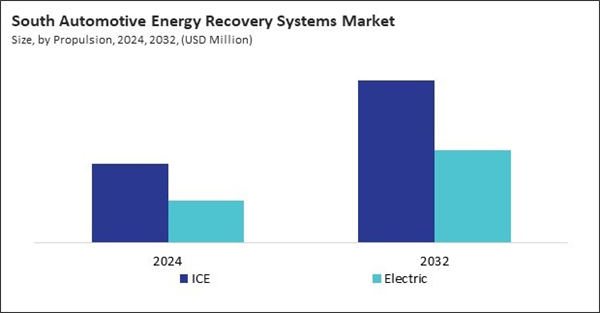The Brazil market dominated the LAMEA Automotive Energy Recovery Systems Market by country in 2024, and is expected to continue to be a dominant market till 2032; thereby, achieving a market value of $709 million by 2032. The Argentina market is showcasing a CAGR of 9.2% during 2025-2032. Additionally, the UAE market would register a CAGR of 7.7% during 2025-2032.
Technological innovation is another major driver of market expansion. Breakthroughs in materials science, such as the development of lighter and more heat-resistant materials, have improved the durability and performance of energy recovery systems. The use of advanced control algorithms and embedded sensors has enhanced the precision and responsiveness of these systems, making them more adaptable to real-time driving conditions.
In addition to technological and regulatory factors, the global push for sustainability and carbon neutrality is influencing automakers to accelerate the deployment of energy recovery systems. Governments and industry coalitions around the world are promoting green transportation initiatives and offering incentives for vehicles equipped with advanced energy management systems. This support has created a favorable environment for the commercialization and adoption of energy recovery technologies, particularly in regions with high levels of urbanization and pollution concerns.
The LAMEA automotive energy recovery systems (ERS) market is emerging as a significant player in the global automotive landscape. Driven by increasing environmental concerns, rising fuel prices, and the growing adoption of electric and hybrid vehicles, the region is witnessing a steady integration of ERS technologies. These systems, including regenerative braking, turbocharging, and exhaust gas recirculation (EGR), are being adopted to enhance fuel efficiency and reduce emissions. While the market is still developing compared to other regions, supportive government policies and investments in sustainable transportation are fostering growth.
A notable trend in the LAMEA ERS market is the gradual shift towards sustainable and energy-efficient transportation solutions. Countries in the region are increasingly focusing on reducing their carbon footprint, leading to the adoption of ERS technologies in vehicles. The integration of regenerative braking systems in electric and hybrid vehicles is gaining traction, as these systems help in recapturing energy during braking, thereby improving overall vehicle efficiency. Additionally, advancements in turbocharging and EGR technologies are contributing to enhanced engine performance and reduced emissions, aligning with global environmental standards.
The competitive landscape of the LAMEA ERS market comprises both international and regional players. Global automotive component manufacturers are expanding their presence in the region through partnerships and collaborations with local companies. This strategy enables them to tap into the growing demand for energy-efficient automotive technologies. Local manufacturers are also investing in research and development to innovate and offer cost-effective ERS solutions tailored to the specific needs of the LAMEA market. The competition is fostering innovation and driving the adoption of advanced ERS technologies across the region. Thus, the LAMEA ERS market is gaining momentum, propelled by regional initiatives and a growing commitment to cleaner transportation solutions.
List of Key Companies Profiled
- Robert Bosch GmbH
- Denso Corporation
- Continental AG
- ZF Friedrichshafen AG
- Valeo SA
- Eaton Corporation plc
- Hyundai Motor Company
- Mitsubishi Electric Corporation
- Maxwell Technologies
- Schaeffler AG
Market Report Segmentation
By Propulsion
- ICE
- Electric
By Subsystem
- Regenerative Braking System
- Turbocharger
- Exhaust Gas Recirculation
By Vehicle
- Passenger Cars
- Light Commercial Vehicles
- Heavy Commercial Vehicles
By Country
- Brazil
- Argentina
- UAE
- Saudi Arabia
- South Africa
- Nigeria
- Rest of LAMEA
Table of Contents
Companies Mentioned
- Robert Bosch GmbH
- Denso Corporation
- Continental AG
- ZF Friedrichshafen AG
- Valeo SA
- Eaton Corporation plc
- Hyundai Motor Company
- Mitsubishi Electric Corporation
- Maxwell Technologies
- Schaeffler AG









